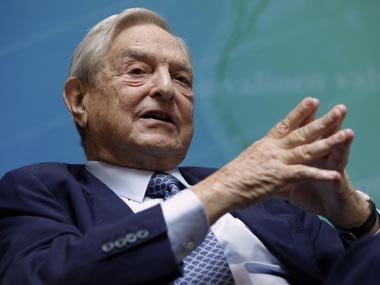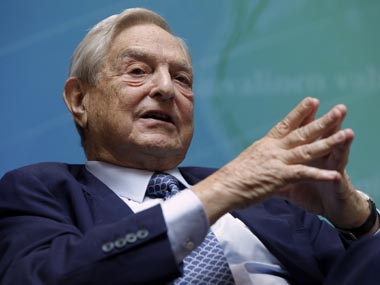George Soros likes to believe that he has managed to make all the money that he has, by following what he calls the theory of reflexivity. Not everyone believes this though.
His son Robert, offers another explanation for his success in Michael Kaufman’s Soros: The Life and Times of a Messianic Billionaire. As Robert puts it “My father will sit down and give you theories to explain why he does this or that. But I remember seeing it as a kid and thinking, Jesus Christ, at least half of this is bullshit, I mean, you know the reason he changes his position in the market or whatever is because his back starts killing him. It has nothing to do with reason. He literally goes into a spasm, and it’s his early warning sign.”
Soros himself has some doubts. As he writes in The New Paradigm for Financial Markets - The Credit Crisis of 2008 and What It Means “To what extent my financial success was due to my philosophy is a moot question because the salient feature of my theory is that it does not yield any firm predictions. Running a hedge fund involves the constant exercise of judgement in a risky environment, and that can be very stressful. I used to suffer from backaches and other psychosomatic ailments, and I received as many useful signals from my backaches as from my theory. Nevertheless, I attributed great importance to my philosophy and particularly my theory of reflexivity.”
[caption id=“attachment_1072405” align=“alignleft” width=“380”]  Billionaire investor George Soros. Reuters[/caption]
So what is the theory of reflexivity? As Soros writes “The crux of the theory of reflexivity is not so obvious, it asserts that market prices can influence the fundamentals. The illusion that markets manage to be always right is caused by their ability to affect the fundamentals that they are supposed to reflect…Buy and sell decisions are based on expectation about future prices, and future prices, in turn, are contingent on present buy and sell decisions.”
Now what does that mean in simple English? Let’s understand this in the context of the rupee which has depreciated rapidly against the dollar in the last few months.
Impact Shorts
More ShortsThe rupee largely fell because of our high current account deficit. The current account deficit is the difference between total value of imports and the sum of the total value of its exports and net foreign remittances. Simply put, our demand for dollars was more than their supply. The rupee was also adjusting for the high consumer price inflation that we have had for a long time now.
So the rupee falling against the dollar was a given. The fall in the value of the rupee was reflecting the economic fundamentals of India. Or as conventional economic theory goes, market prices reflect the fundamentals on most occasions.
The trouble is that rupee has had a free fall and this has led some economists to believe that it has fallen more than it should have to reflect India’s economic fundamentals. As Rohini Malkani, Prachi Mishra and Aman Mohunta write in The Economic Times, “However, with the rupee around 65-66 to a dollar, it has overshot its equilibrium value and is undervalued at current levels.”
Simply put, the value of the rupee against the dollar has fallen more than it should have to reflect India’s economic fundamentals. The trouble with this argument, like most arguments made by theoretical economists is that it tends towards ’equilibrium'.
While the fall in the value of the rupee reflects India’s economic fundamentals, at the same time the fall in the value of the rupee also impacts India’s economic fundamentals. Malkani, Mishra and Mohuna do not take the second factor into account.
As the rupee falls, Indian oil companies need to pay more for the oil that they import. If the government chooses not to pass on the higher cost onto the end consumers ( as it has done in the past) this means that the oil companies need to be compensated for the “under-recoveries”.
This means a higher expenditure for the government. A higher expenditure in turn means a higher fiscal deficit. Fiscal deficit is defined as the difference between what a government earns and what it spends. This will lead to more borrowing by the government and will crowd out private sector borrowing (for banks as well as corporates) leading to higher interest rates. Higher interest rates will have slowdown economic growth further.
If the government chooses to pass on the increase in the cost of importing oil to the end consumer, it will lead to higher inflation. A higher inflation can’t be good for economic growth either. A weaker rupee will also make other important imports like fertilizer, coal, palm oil etc, costlier. This will have its own impact on economic growth as people will cut down on consumption to meet higher expenses.
India’s external debt as on March 31, 2013, stood at at $390 billion. Of this nearly 79% debt is non government debt. External commercial borrowings(ECBs) made by corporates form nearly 31% of the external debt. This is not surprising given that the Credit Suisse analysts point out that 40-70% of the loans of 10 big corporate groups that they studied for a recent research report, are foreign currency denominated.
With a weaker rupee, as these loans mature, corporates will need more rupees to buy dollars. And this will have a huge impact on their profit and loss accounts. Lower profits or losses are obviously not good news.
A weaker rupee also has an impact on Indian exports, given that India’s top exports like gems and jewellery, organic chemicals, vehicles, machinery and petroleum products, are all heavily import dependent. Hence, people in this business will have to pay more in rupee terms to import raw materials that they need to make their finished products. This will have an impact on the pricing of exports and explains to a large extent why a weaker rupee doesn’t necessarily always lead to higher exports.
What this means is that a fall in the value of the rupee will soon start impacting India’s economic fundamentals or perhaps it already has. And this in turn will mean a further fall in the value of the rupee. Swaminathan Aiyar explained it best in a recent column in The Economic Times “Many experts say the rupee has overshot and will come back. Really? Remember the same thing was said about the Indonesian rupiah when it depreciated from 2,500 to 3,000 to the dollar in 1997, but it eventually went all the way to 18,000. Estimates based on fundamentals quickly become meaningless because a crisis changes fundamentals hugely. The crashing rupee has already changed the economy’s fundamentals.”
To conclude, the rupee will fall because the rupee will fall.
Disclosure: The idea for this article came from Swaminathan Aiyar’s column Get ready for another Asian Financial Crisis in The Economic Times)
(Vivek Kaul is a writer. He tweets @kaul_vivek)


)

)
)
)
)
)
)
)
)



